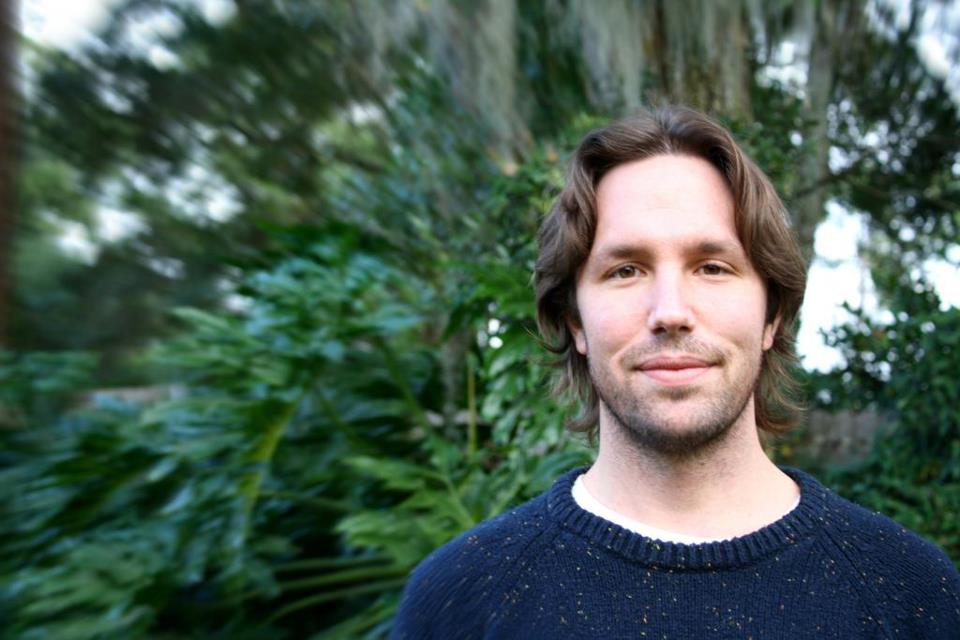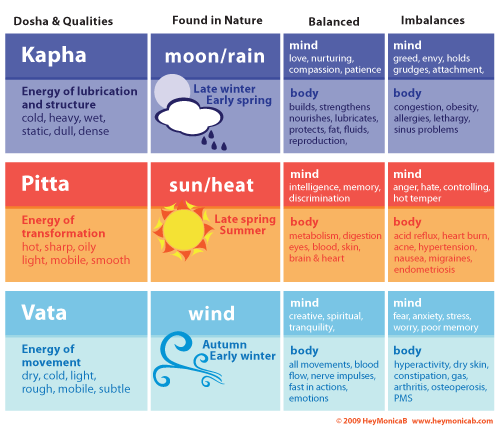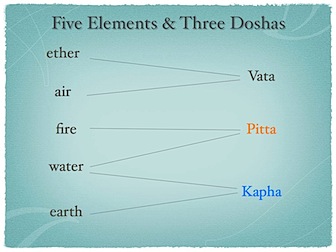I’m always fascinated to hear natural ways to stay healthy and balanced, and even more excited when I get to experience it working. I met Kyle Roberts in 2011 and have kept in touch with him over the years about how to keep my life in balance using Ayurveda. He has been a great help and resource, so I was excited to interview him on ways to keep life balanced through Ayurveda. I asked him how we can stay healthy during this time of year (the transition from fall to winter) when so many people are getting sick with colds and sore throats, how to keep digestion regular, and how to use Ayurveda to help calm stress and anxiety when life becomes scattered and busy. Read on….
Monica: How would you describe Ayurveda to someone that didn’t have much knowledge of it? What is the purpose and how would you define it?
Kyle: Ayurveda is life science so it’s intended to not only create longevity, but also put wellness into the individual that experiences it. It is the science of life that it creates well being on a physical, mental, and spiritual level.
Monica: Regarding the three doshas; I’m under the impression that we are always working with all three of them, but that we all have a dominant dosha. So, my question is, how important is it to know your dosha, and how can we keep them in balance for a healthy lifestyle?
Kyle: The most important thing in understanding the three doshas is understanding your environment. Since the doshas ( Vata, Pitta, and Kapha) are composed of the 5 elements (Earth, Air, Fire, Water, Ether), and the 5 elements compose everything in the material world, it’s important to have a good relationship with the things that govern the body. It’s important to know your dosha, but it’s more important to know yourself energetically, physically, and emotionally as best you can. It’s better to know how the body responds to food, relationships, routine, work and school in life.
Monica: How can someone determine their dosha?
Kyle: A lot of people do online quizzes, but I find that the quizzes lead people astray and confused. People also like to identify with something, but it’s more important to know what a dosha does positively, and endorse those traits, and then minimize the lust and desirous attributes when a dosha doesn’t do well. It’s much better to have a consultation with someone than to take an online quiz.
Monica: We’re at a time where a lot of people are getting sick because of the drastic weather changes. What is your best advice on how to stay healthy during this time of year?
Kyle: When fall is moving into winter, it’s important to keep vata and kapha in control. When the season is in transition it’s important to nurture the earth element.
Wear Layers
- This means that for people that are disturbed by wind and cold, it’s important to wear plenty of layers; Keep a hat on, wear a scarf, and long underwear if necessary.
Consume Earthy Foods
- Consume Earthy type foods such as Sweet potatoes; things that are warm and unctuous.
- Food that are sweet naturally sweet such as basmati rice and maple syrup.
- Warm and oily food such as oatmeal.
- Foods that heat well – fresh ginger tea with natural sweetener like maple syrup or honey.
Stay Grounded
- It’s advisable to do a warm oil massage with sesame oil before bathing in the mornings.
- It’s important to stay grounded, and above all, stay calm.
Monica: What is your best advice on keeping digestion regular?
Kyle: The key to keeping digestion regular is really knowing and understanding what foods work well in your system. Become very aware of when you are eating. People tend to become distracted by a noisy restaurant, music, the television, or on the telephone or computer or book while eating. Most important thing is to just form a relationship with food that you’re eating.
“Drink your food, chew your water”
- Chew food thoroughly to a point where it’s somewhat liquid so it goes down your throat easily.
- Be patient and calm when you eat
- When you’re done with your food, don’t necessarily go right into an activity, but relax for a few minutes.
- Go on a two minute walk to help aid with digestion
“½ of stomach should be food, 1 quarter should be water (room temperature), and other quarter should be air”
Monica: What is your stance on raw food?
Kyle: Everyone’s digestion is so different. Many people can benefit from raw food if they are capable of doing it. Ayurveda traditionally does not endorse raw food, but I’ve always supported people experimenting with what works best.
From a very traditional ayurvedic perspective, raw food is better for pitta individuals in the summer time. As we approach the colder season, raw tends to aggravate vata, so, that’s kind of to be avoided for individuals who have high vata.
Monica: What are the benefits of ghee?
Kyle: Ghee naturally doesn’t expire, and gets better as it ages. It’s great to consume something that does not expire because the body becomes what you consume. Ghee is a great anti-inflammatory and a healthier fat to consume than butter, so it’s great for joint health for practicing yogis.
- It aids in flexibility.
- It’s great for memory
- increases digestive strength.
Monica: Do you recommend cooking it or eating it solid and raw?
Kyle: The great thing with ghee is that you can heat it to extremely high temperatures and it doesn’t break, so you can cook with it and the integrity remains. Use it in a stir-fry, and it’s fantastic adding more on top of the food at the end if you need it to be oilier.
Fun Fact: if you tend to have bloody noses in winter when things get too dry, you can rub ghee to the inside of the nostrils and it will stop the bleeding.
(side note from Monica: I use the ghee from Ancient Organics which I did extensive research on and love because of how they treat the animals, because they stick to tradition, and they use mantra and vedic practices while making the ghee)
Monica: According to Ayurveda, lunch is supposed to be the biggest an most important meal. Do you eat lunch as the biggest meal, and how can someone make that change?
Kyle: Get out of the norm. Test yourself. Experiment. I like having lunch as the largest meal of the day. A lot of people enjoy having breakfast as the most important meal of the day, but I always say, don’t be so stuck in a way that you can’t change. Ayurveda does say lunch is the most important meal of the day, and I personally keep that the largest meal of the day.
Monica: It seems like so many people experience high stress and anxiety because of work or being too busy. How can Ayurveda help with controlling stress and anxiety?
Kyle: Becoming aware of the emotion is really beneficial. When stress and anxiety arise, really meditate on the source of it. Where is it coming from? How is it intensifying? Where is it located in the body? Then, forming a great relationship with the breath and noticing how that has an effect on the emotion.
Monica: Should this be done through sitting meditation and breathing?
Kyle: If someone is too busy and has a lot of anxiety, sitting meditation is probably the last thing they would want to do. Even though it might be the best thing; if someone is a single parent, has three kids and a full time job, then sitting for meditation is kind of impractical.
It’s helpful to be present in all moments. Work on loosening the grip on perfection by trying your best to be calm no matter how intense things get. Even faking being calm is important.
People get taken over by anxiety and other things, so it’s hard to become calm. This is why it’s good to have a yoga or meditation practice because the repetition of practice over and over creates a memory of calmness. This way, when madness happens, you have that memory to go back to.
Monica: How has Ayurveda changed you. How have you benefited from it?
Kyle: I think that one of the most important things is that it’s given me an understanding of dharma and a sense of purpose. I understand what aspects influence me positively and negatively, and how I influence my environment and society. It’s traditional and old, but you have to make it applicable what’s current, present, and always changing in your environment. It’s helped me be healthy in a really simple way.
Are you interested in an Ayurvedic consultation or have a question for Kyle? You’re in luck!
His home base is Jacksonville, but he does most of his consultations over the phone or when he’s traveling doing workshops.
He’s happy to hear from you! Send him an email at kbrightroberts@gmail.com for affordable rates, and to start the consultation process.
Kyle Roberts is an Ayurvedic consultant Kyle Roberts is a graduate of the Ayurvedic Institute in Albuquerque, New Mexico where under the tutelage of Dr. Vasant Lad he studied the theoretical and clinical aspects of Ayurveda. Before, during, and after his formal ayurvedic training Kyle has studied Jyotish (classical vedic astrology), Ashtanga Yoga, Sanskrit, and herbology, as well as various practices of meditation and pranayama. He has studied throughout the United States and in India, working to integrate both eastern and western cultures into digestible forms of practical information. Kyle’s efforts are spent teaching various subjects within yoga and ayurveda as well as integrating classical healing practices with modern practicality for individual health concerns.
How have you incorporated Ayurveda in your life? How has in changed you? What’s the first step you would recommend to others? Did this leave you with any questions? Please ask in the comments below!
Want to learn about your body type? Take this constitution quiz here!
If you liked this please share! Thanks!









Great interview Monica. What is Ghee?
Hey! Ghee is the purest form of butter, but I think the Ancient Organics says it best on their site:
“In India, ghee has always been a sacred and celebrated symbol of auspiciousness, nourishment and healing; especially in the daily rituals of cooking and worship.
Ghee is a premium cooking oil celebrated for its taste, nutritional benefits, and medicinal qualities. Ayurveda, the ancient medical science of India, recognizes ghee as an essential part of a balanced diet, and considers it to be the best fat one can eat. Ghee is the very essence of butter; the end result of a long, slow, careful clarification process that removes all the moisture, milk solids and impurities. The absence of milk solids and water in ghee make it completely shelf stable. Ghee has one of the highest flash points (485ºF) which make this oil the best choice for high temperature cooking.
Ghee is comprised of full spectrum short, medium and long chain fatty acids, both unsaturated and saturated. Ghee contains Omega 3 and Omega 9 essential fatty acids along with vitamins A, D, E and K. Ghee made from organic butter of pastured cows is one of the highest natural sources of CLA (Conjugated Linoleic Acid). 9 phenolic anti-oxidants, as well as numerous other minerals are present in ghee.
Ghee is known as a substance that gives longevity, its elemental qualities balance the aging characteristics by enriching the living body.
Ghee has been used for centuries as a digestive and elimination aid, for energy, sexual vitality, skin and eye health, as a lubricant for the joints and for alkalizing the blood.
The purity of ghee allows it to be deep penetrating and nourishing as it passes through the lipid membranes of cells. For this reason, the vitamins and minerals from food cooked in ghee will be drawn deep into the body where they impart the most benefit. The assimilation of the nutrients increases when suspended in a ghee matrix. When you add spices to ghee to cook with the flavor is carried deep into the food. Many herbal preparations use ghee as the carrier oil because of these characteristics”
I hope that helps!
Thanks Monica. I’ll look for it at Whole Foods!